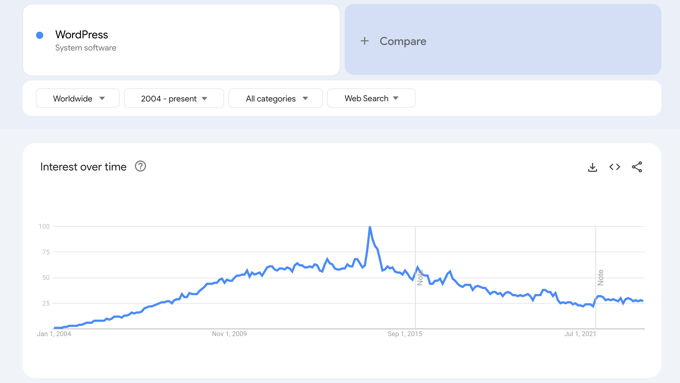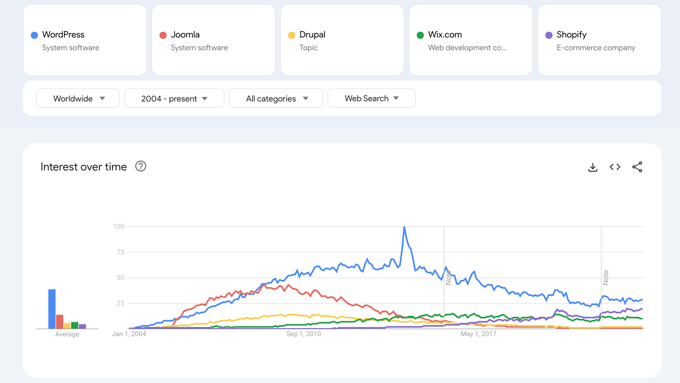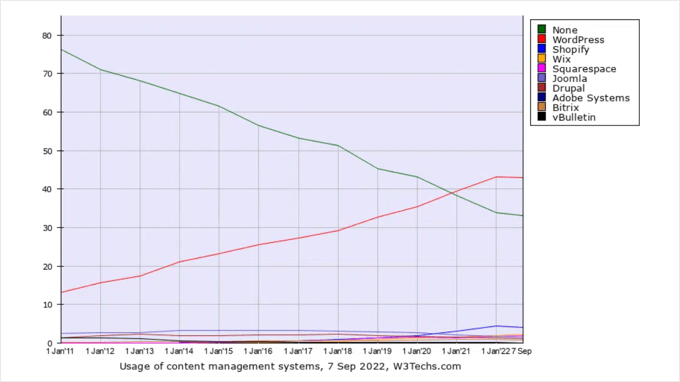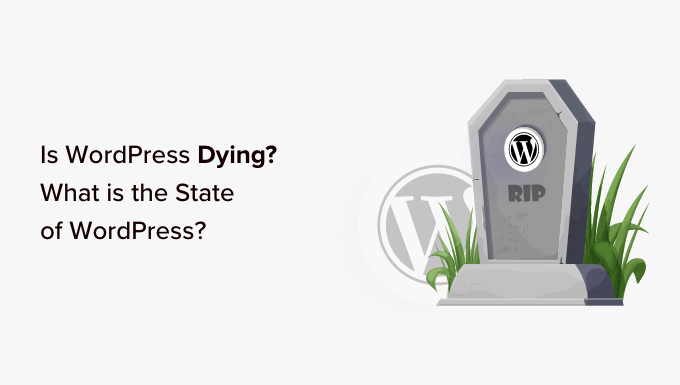Have you seen claims and rumors that WordPress is dying or about to be replaced by some newer website builder or software?
You may be wondering if the rumors are true. Maybe you are even questioning whether it’s worth using WordPress at all.
In this article, we will take a look at the state of WordPress to show you there’s absolutely no truth to the rumors that WordPress is dying.
Why Are There Rumors About WordPress Dying?
Some people are spreading rumors to discourage you from building a WordPress website. They may make claims on Twitter or Reddit that WordPress is dying or even write full blog posts about it.
It’s hard to know why. Maybe when they see the huge success of WordPress, they wonder how long it can continue. Or maybe they are using an alternative to WordPress that they are convinced is about to take over the world.
Whatever their motives, when you look at the facts, these rumors are simply not true. There is absolutely no indication that WordPress is dying or its loyal users are about to abandon it.
With that being said, let’s take a careful look at the state of WordPress to see if there is any reason to believe that WordPress is dying. You can use the quick links below to jump to different parts of our article:
WordPress in Google Trends
We will start by looking at WordPress search volume. We will start here because these figures are often used as evidence that interest in WordPress is declining.
Here is a graph from Google Trends showing search interest in WordPress since 2004.

This graph shows that there was an astonishing level of search interest in WordPress around 2014. However, there is still a lot of interest in WordPress today.
You can’t easily see that by looking at the graph above. So let’s add some context. Here is the same graph, but this time we have added some of the top WordPress alternatives.

You can see that there is more search interest in WordPress than in any other content management system (CMS).
Recently, you can see that searches for alternatives like Wix and Shopify have been increasing. These platforms may be easier for beginners to get started with.
However, over time, many users become frustrated with their lack of customization or that they can’t run these websites on their own servers. You can learn more in our comparisons of Wix vs. WordPress and Shopify vs. WooCommerce.
WordPress Market Share
Now that we have looked at search volume, you may be wondering how many websites are actually using WordPress and how that compares with other web platforms.
In short, WordPress dominates the market. No other platform comes close.
Currently, more than 43% of all websites are using WordPress as their content management system. That’s 810 million websites in total. And WordPress holds nearly 65% of the global CMS market share.
Also, WordPress is being used by the most successful companies. 38% of the top 10,000 websites are powered by WordPress. WordPress powers websites for big-name brands, including Disney, Sony, Facebook, and more.
This graph from Colorlib can help you visualize WordPress’s huge market share.

You can see that websites that don’t use a content management system (green line) have been steadily declining. Meanwhile, WordPress adoption (red line) has been steadily growing, and other content management systems barely register on the graph.
For example, Shopify is the second most popular, but it only powers about 4.4% of all sites, and Wix spends tens of millions in marketing, but it only powers 1.9%.
WordPress is alive and well, and it’s hard to believe that over 43% of website owners who have carefully chosen WordPress are all suddenly going to change their minds.
The State of WordPress Security
Having such a large market share, WordPress is a common target of hacking attempts, DDOS attacks, malware, and trojans.
The good news is that WordPress core goes through rigorous security audits, and it’s more secure than many other platforms.
However, you can never take website security for granted. Statistics from Sucuri, a leading website security company, show that about 97% of WordPress website hacks occur when their owners don’t follow safe security practices:
39% of hacked WordPress websites were using an outdated version of the software. That’s why you should always use the latest version of WordPress on your website.
Nearly 50% of WordPress sites are affected by a security vulnerability caused by an outdated or poorly-coded WordPress plugin or theme.
Around 8% of WordPress sites were hacked due to a weak password.
You can make your WordPress site as secure as possible by following some basic security best practices. To learn more, see our complete WordPress security guide for step-by-step instructions.
The State of WordPress Updates
WordPress has been around since 2004. However, the software is regularly updated to add new features and keep the user interface current.
WordPress is an open-source project and is driven by a global community of users. This means that anyone can contribute to the project in many different ways:
The WordPress translation community has fully translated the CMS into over 50 languages and partially translated more than 200.
WordPress communities around the world organize multiple WordCamps each year, as well as thousands of other meetups in various countries.
There are dozens of WordPress groups on Facebook, with WPBeginner Engage being the largest WordPress Facebook group with 95,000+ members.
The development team release updates several times a year, such as WordPress 6.3, which was released in August 2023. These can include bug fixes, security updates, and new features.
Past WordPress update highlights include the Gutenberg editor, which lets you easily add new elements to blog posts using blocks. The full site editor works in a similar way with customizing themes. And the command palette tool lets you be productive by quickly doing tasks from the keyboard.
Every year the platform becomes more powerful and easier to use. If you take a look at our article on the evolution of the WordPress user interface, then you will see at a glance how modern the latest interface is.
Besides the new features in WordPress itself, you can also add new features using plugins.
The State of WordPress Plugins
The biggest reason behind WordPress’s popularity is its large plugin ecosystem. No other web platform has as many to choose from.
Plugins are like apps for your WordPress website. You can install them to add new features to your site and extend its functionality. To learn more, see our guide on WordPress plugins and how they work.
There are more than 60,000 free WordPress plugins in the WordPress.org Plugin Directory alone. Currently, the 61 top WordPress plugins are installed on more than 1 million websites, and 9 of those plugins are installed on 5 million+ websites.

With a healthy plugin ecosystem, you can add custom functionality to your website at a fraction of the cost of custom development.
There are free WordPress plugins available for just about every type of website functionality, including contact forms, selling memberships, landing page builders, and SEO optimization.
Whatever feature you wish to add to your WordPress website, you are sure to find a plugin that can do it.
The State of WordPress Themes
Themes control the appearance of a WordPress website. They are WordPress-specific website design templates that you can install on your website to change the way it looks.
The WordPress theme ecosystem is very rich. There are thousands of free and paid WordPress themes available, offering WordPress users an endless combination of design, layout, color schemes, and features.
WordPress.org’s free theme directory has more than 10,000 free WordPress themes.
Besides this, there are many excellent premium themes like Divi and Astra. You can even build your own custom theme with SeedProd. No other CMS offers the same level of customization as WordPress.
The WordPress Economy
While WordPress itself is free, it has inspired a thriving, multi-billion-dollar ecosystem that creates thousands of jobs all over the world. These include freelancers, developers, and companies that sell WordPress-related products and services.
Thousands of WordPress jobs are currently open on many popular freelancing websites and job boards. The average hourly rate for WordPress developers can be anywhere between $20-$100 per hour, depending on their expertise and the job at hand.
There are hundreds of small and large businesses, agencies, and developers selling WordPress-related products. You can see our list of the most influential WordPress businesses and companies and what they do.
These companies are highly invested in WordPress and strongly contribute to its success.
The State of WPBeginner and Awesome Motive
As you know, WPBeginner and our parent company, Awesome Motive, completely rely on WordPress for our success. We have no doubt that WordPress is alive and well and is the best choice for you to build your website.
That’s why we create WPBeginner tutorials, YouTube videos, and premium WordPress video tutorials to help small businesses grow and compete with the big guys.
We also create many plugins and tools like All in One SEO, SeedProd, MonsterInsights, and WPForms so that you can create a successful website that does everything you need.
Thanks to our awesome community, WPBeginner and Awesome Motive have continued to grow year after year.
In 2022, we reached a huge milestone. We were featured on the NASDAQ billboard in Time Square for passing 20 million active installs of our products.

That was huge, but we soon reached an even bigger milestone. In 2023, we were featured on the NASDAQ billboard again for passing 25 million active installs of our products.
As a result, our confidence in WordPress is bigger than ever. We have continued to invest more resources in WordPress and hire new staff, and now have over 300 team members in 50+ countries. We only see the success of WordPress growing and want to be part of it.
We hope this tutorial reassured you that the state of WordPress is alive and well. You may also want to see our guide on how much it costs to build a WordPress website or our expert pick of the best WordPress hosting to get started with your own website.
If you liked this article, then please subscribe to our YouTube Channel for WordPress video tutorials. You can also find us on Twitter and Facebook.

